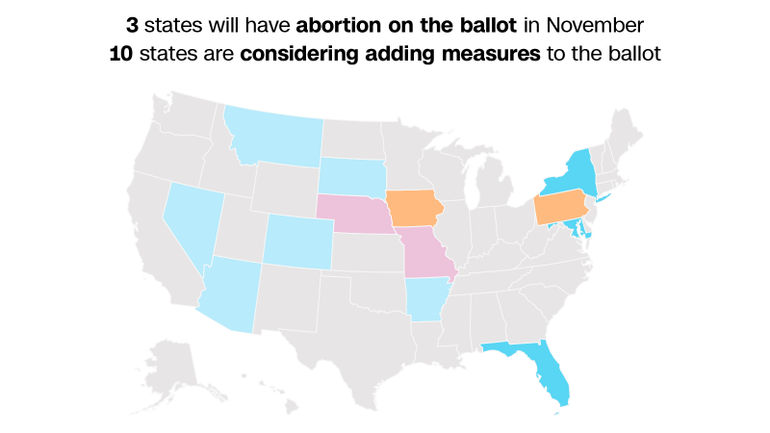
States to Watch: Potential November Ballot Impact on Abortion Rights

In the upcoming November elections, states are gearing up for crucial votes that could significantly impact abortion rights within their borders. Voters will have the opportunity to shape the future of abortion access in these key states.
This November, voters in various states may have the opportunity to vote on measures that could impact abortion access in their state. Organizers are working on getting these measures on the 2024 ballot, some aimed at restoring or protecting the right to an abortion, while others aim to restrict it.
After the Supreme Court's Dobbs decision overturned Roe v. Wade in 2022, removing the national right to an abortion, abortion rights advocates are hopeful that these efforts will bring the issue of reproductive health access back to the people.
Most of the proposed ballot measures in November focus on establishing the right to abortion in state constitutions. They come after laws that limit abortion rights were put in place following the Dobbs decision. Some of these measures challenge previous abortion policies set by politicians or state supreme courts. In addition to these measures, there are also efforts to restrict access to abortion, although similar measures have not succeeded in states where they have been voted on recently.
Three states, Florida, Maryland, and New York, have already included abortion measures on the 2024 ballot. Many are closely watching Florida, as it is a crucial location for individuals seeking abortion services in a region where access is becoming increasingly limited. On May 1, a six-week abortion ban is expected to be introduced, replacing the state's current 15-week ban.
States with potential abortion ballot measures
Organizers in different states around the country are making efforts to obtain funding, collect signatures, and navigate the legal requirements needed to place abortion measures on the 2024 ballot.
In many states, the procedure involves gathering a specific number of signatures by a set deadline this summer. Some states also require the ballot language to be approved by a state court, as noted by campaign organizers. These abortion rights initiatives are mostly supported by groups of reproductive health advocates, many of whom are raising funds to back the campaigns.
Several states, including Arizona, Nevada, and Montana, have introduced measures to protect abortion access up to around 24 weeks into pregnancy, considered the point of viability by doctors. In Arkansas, a potential measure could allow abortion up to 20 weeks into pregnancy, or in cases of rape, incest, or fatal fetal anomalies. Meanwhile, South Dakota is considering eliminating restrictions on abortion in the first trimester, with more limitations in the second trimester and the option to regulate or prohibit abortion in the third trimester.
In Missouri, one potential measure aims to broadly safeguard reproductive care. Another proposed measure seeks to permanently establish the state's near-total abortion ban in the constitution.
Some states, such as Nevada and Montana, have proposed measures that would permit abortion after the point of viability if a doctor determines it is necessary to protect the life or health of the pregnant individual. However, there is difficulty in defining the specific medical emergencies that would qualify for this exception.
On the other hand, proposed measures in Iowa and Pennsylvania aim to restrict access to abortion by prohibiting the use of public funds for the procedure. These proposed restrictions are facing challenges in passing through their respective state legislatures.
Voters in at least two states could see dueling measures aimed at protecting and restricting abortion access on the 2024 ballot.
States that have voted on abortion post-Dobbs
Seven states have already held votes on abortion access following the overturning of Roe v. Wade. Reproductive health advocates are encouraged by the strong support for abortion access shown by voters. Measures aimed at protecting abortion access have been successful, while those seeking to restrict it have not passed.
In states like California, where support for abortion access is strong, organizers believe these votes provide additional legal protection for patients and healthcare providers. They also serve as a clear message to elected officials about the desires of the voters.
CNN’s Molly English contributed to this report
Editor's P/S:
The upcoming 2024 ballot measures on abortion access present a crucial opportunity for voters to shape the reproductive landscape in their states. After the Supreme Court's Dobbs decision, abortion rights advocates are determined to restore and protect the right to an abortion through ballot initiatives. However, anti-abortion groups are also mobilizing to restrict access.
The article highlights the efforts of organizers in various states to gather signatures, secure funding, and navigate legal requirements to place abortion measures on the ballot. It also discusses the different approaches taken by these measures, ranging from establishing the right to abortion in state constitutions to restricting public funding for the procedure. The outcome of these measures will significantly impact the availability of abortion services and the ability of individuals to make decisions about their own bodies.










